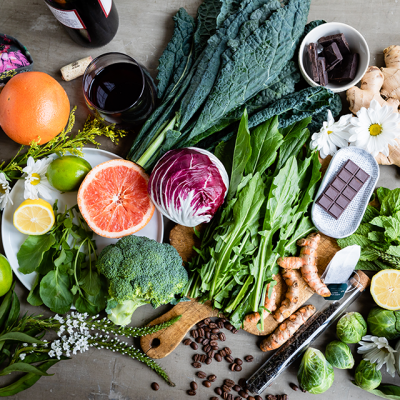What many people consider to be just a normal part of eating—symptoms of digestive discomfort like gas, bloating, heartburn and upset stomach, are not only not normal or healthy, these symptoms can actually indicate much more serious health imbalances.
Health is dependent on what foods we eat, but it’s also dependent on the health of our digestive system. All health begins in the gut. When you don’t properly digest your food, you run the risk of food moving too slowly (you get constipated and food rots in your gut) or too quickly (diarrhea) through your digestive tract, which doesn’t allow for the proper absorption of critical nutrients. Chronic illness has its roots in poor nutritional status and the inflammation that results from poor digestion.
When you heal your digestion, you slash your risk of so many illnesses that plague us in modern times.
Digestion depends on a complex orchestra of enzymes, acids, microflora, nerve impulses, muscle contraction, proper blood flow, and immune cells…so much of it gets impacted by the foods we eat and the environment (stress) we surround ourselves in.
Probiotics are the current superstars for healthy digestive function. There’s good reason for this—it’s crucial to have optimal populations of the good bacteria inhabiting the colon—bugs like lactobacillus and bifidobacteria species. Eating fermented probiotic-rich foods like sauerkraut, kimchi, kefir, yogurt, miso, and tempeh are important foods to add to your diet. Another less popular class of foods you can add to your diet to ensure healthy digestion are bitters.
Bitter, the Forgotten Flavor
The bitter taste is one of five flavors registered by receptors on the tongue; the others are salty, sour, sweet and umami. Much of the food we eat today is mild and overly salted and sweet. Eating bitter foods can help balance out the cravings for sweet foods. But that’s not all they can do, bitters:
• Aid digestion
• Stimulate bile juices
• Relax your digestive muscles to get ready to digest food
• Relieve gas, bloating, upset stomach, nausea, heartburn and indigestion
• Reduce sugar and salt cravings, and thereby support healthy blood sugar levels
• Support the liver and gallbladder
• Regulate fat metabolism
• Improve skin and complexion
You can think of bitters as giving your digestive system a workout in order to keep it healthy and toned.
Bitters help release saliva, stomach acid, digestive enzymes, and bile acids, all imperative for breaking down and absorbing carbohydrates, proteins, fats and precious B vitamins, fat-soluble vitamins and trace minerals. Bitters are especially helpful for those eating a high fat or ketogenic diet. To the extent that those good fats are absorbed and used by your body greatly depends on the health of your digestive organs like your liver and gallbladder. Bitters support these organs by increasing the release of critical digestive enzymes and acids so you can extract the most energy and nutrients from your foods.
And since 80% of your body’s immune cells are found in the mucous membranes of your digestive tract, eating bitters greatly enhances your immunity.
While science is just starting to understand the varying mechanisms in how bitters work (turns out different bitters have unique ways of impacting the body and assisting digestion), you can benefit from bitters by utilizing them in the following ways:
• Add bitter salad greens and herbs to your salads
• Take a bitter tonic or tincture (like Swedish bitters) about 20-30 minutes before you eat
• Include bitter foods in your meals
• Drink a glass of red wine or a bitter hoppy beer with your dinner
It’s important to actually taste the bitter flavor of the vegetable or herb you are eating or drinking. Don’t mask it with something that is too sweet. There are taste receptors in our tongue that are part of the important mechanism of how bitters work to aid the digestive process. What once were bitter vegetables, are now bred to satisfy a milder palate. These changes impact the health benefits we receive from the foods.
Make it a point to regularly include foods that have bitter components:
• Greens like arugula, dandelion, chicory, endive, radicchio, sorrel
• Vegetables like Brussel sprouts, chard, kale, rhubarb, artichoke, broccoli, turnip
• Fruits like grapefruit, lemons, limes (especially the peel), cranberries
• Herbs like peppermint, turmeric, ginger
• Dark chocolate, red wine, bitter beer, black and green tea, coffee
I can’t overstate my enthusiasm for bitters! In my travels to Okinawa, Japan, a place that has one of the highest populations of centenarians in the world, I was amazed to learn the common salads that they eat daily are packed full of bitter herbs and vegetables. Learn from the Okinawans and try this delicious salad with bitter greens and healthy fats to enhance your digestion.
Delicious Digestive Salad
Makes 4 servings
½ cup walnuts
1 Belgian endive, leaves chopped
1 cup arugula
2 cups green lettuce or Bibb lettuce, chopped
1-ounce Sopressa salami*, finely sliced and then cut into small strips
2 tablespoons parsley, chopped
2 tablespoons fresh chopped dill
½ grapefruit, peeled and chopped (optional)
2 tablespoons olive oil or SGF MCT Oil, or more to taste
2 teaspoons lemon juice, or more to taste
Salt and pepper to taste
1-ounce parmesan cheese, shaved
Instructions
1. Heat walnuts in a dry, heavy skillet over medium heat for a few minutes until golden brown and they start to smell toasted. Be careful not to burn, stir often. Set aside until cool and then chop.
2. Place the endive, arugula and lettuce in a medium bowl. Top with salami, parsley, dill, chopped walnuts and optional grapefruit. Toss with oil, lemon juice, salt and pepper. Add cheese and serve. Add more oil, lemon juice, salt and pepper as needed.
*Choose anti-biotic free, nitrate-free, sugar-free and minimally processed salami






